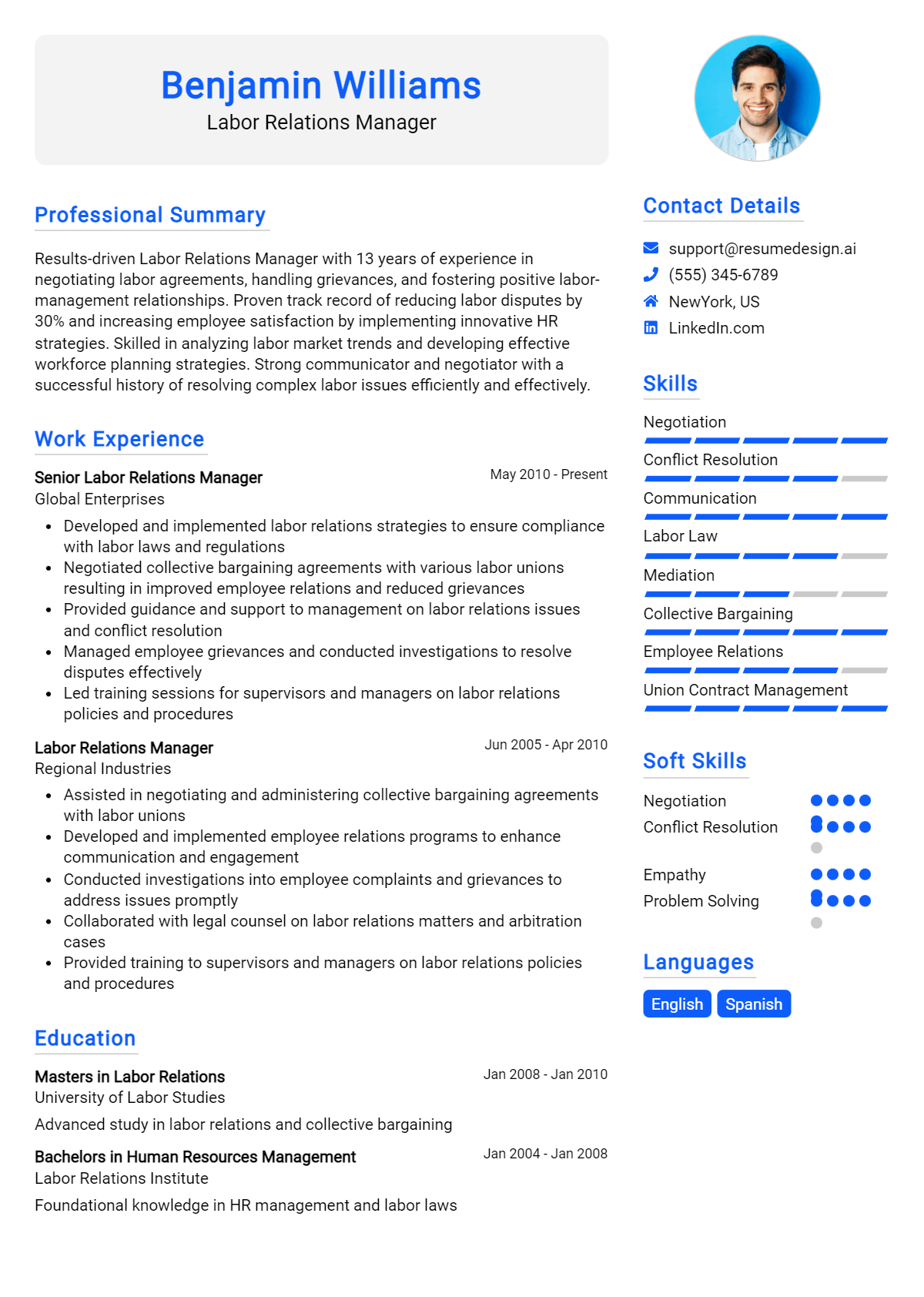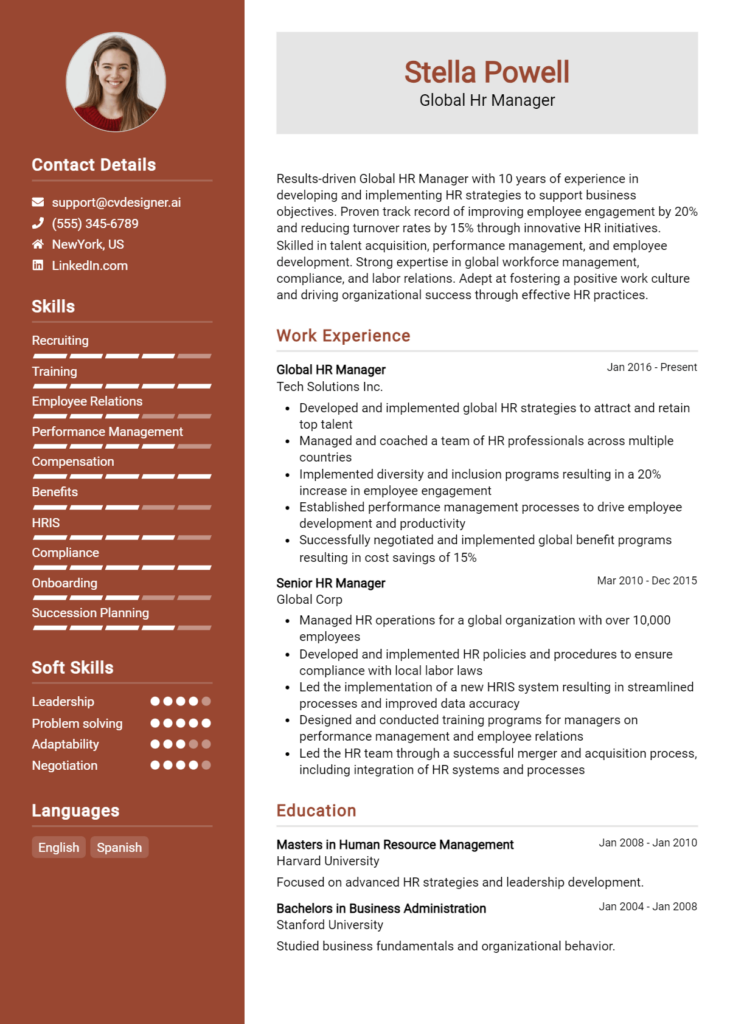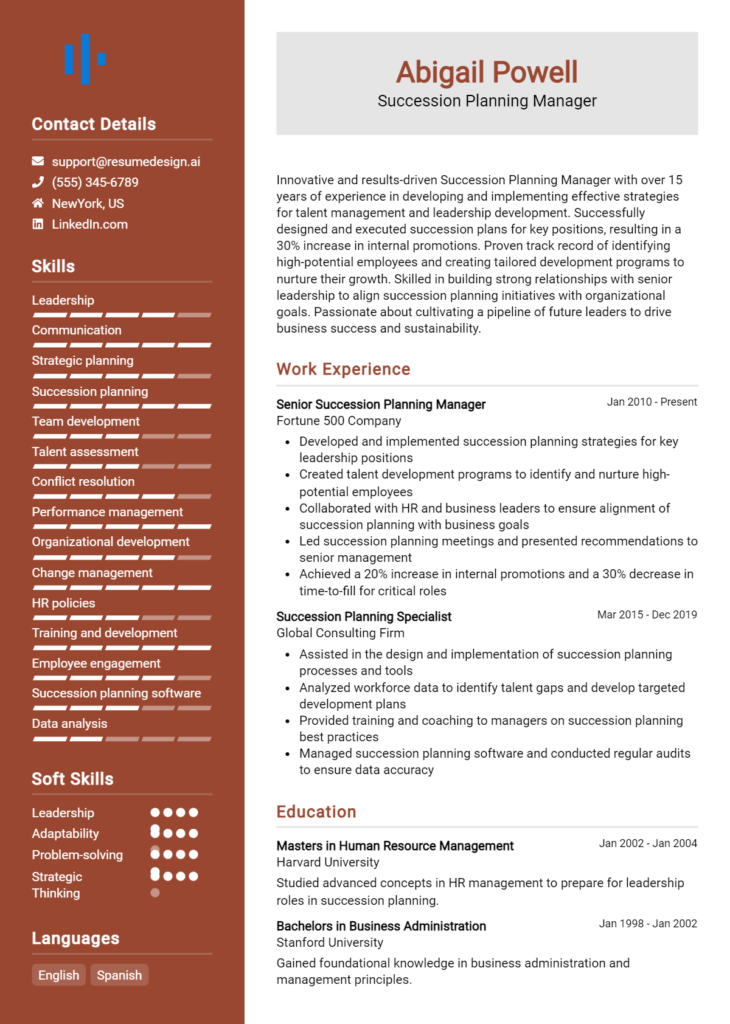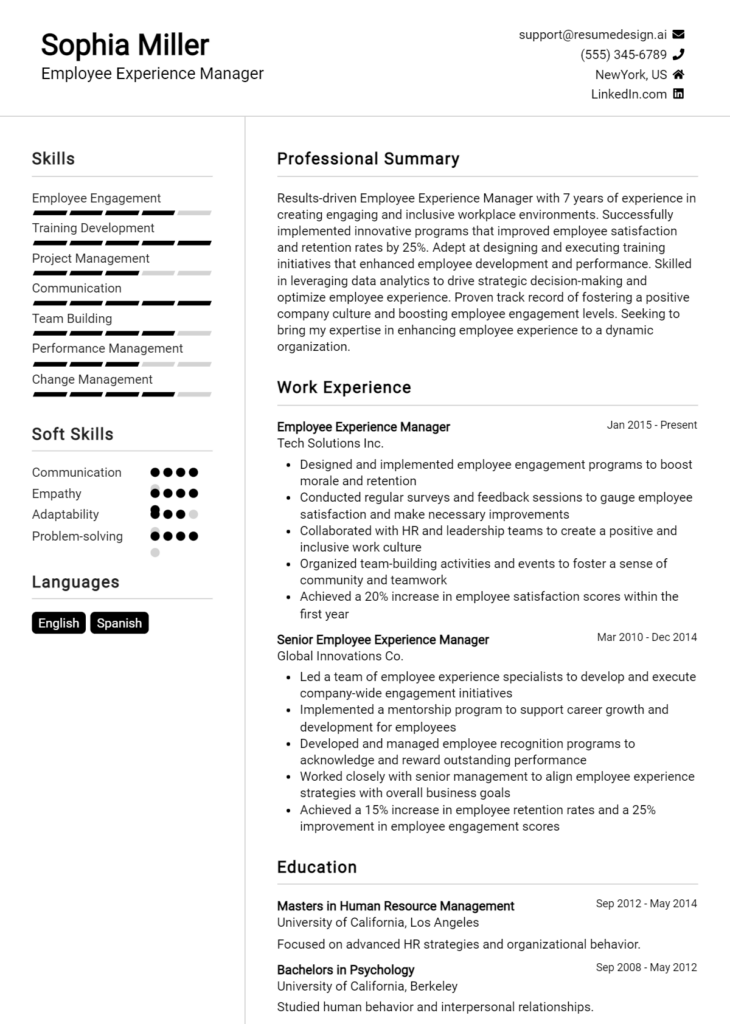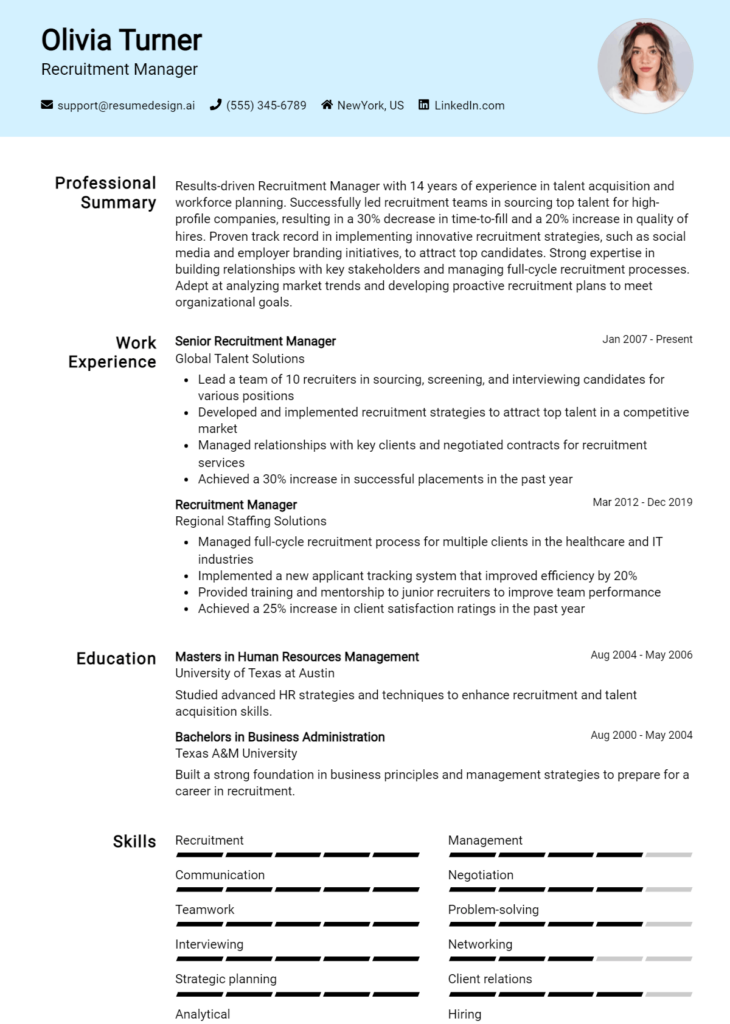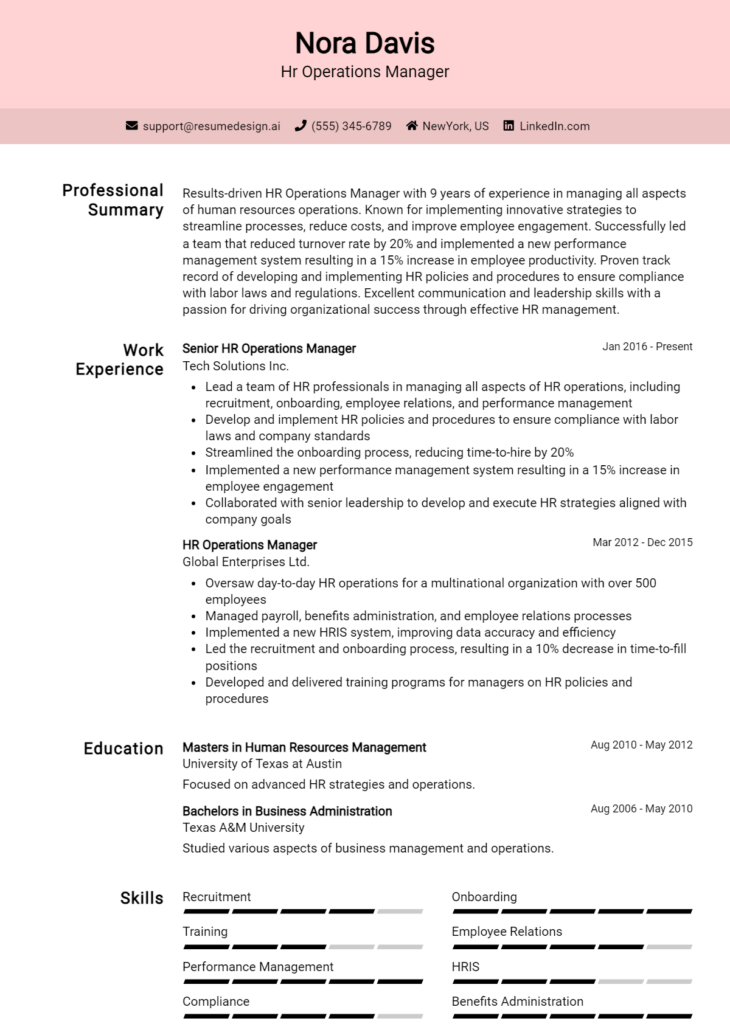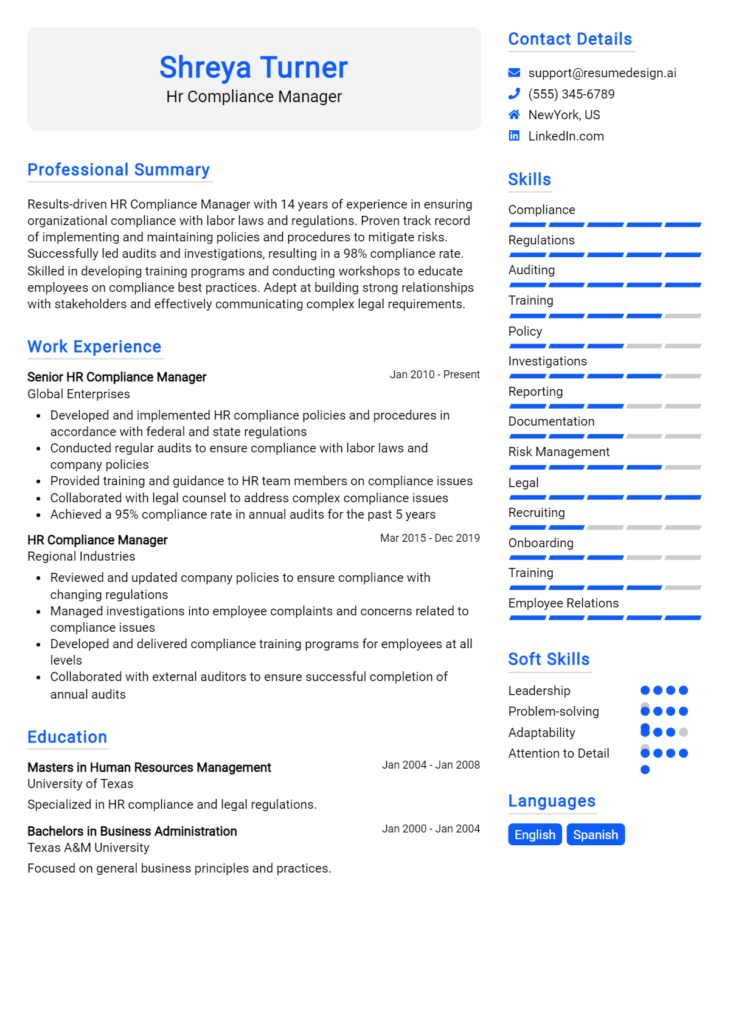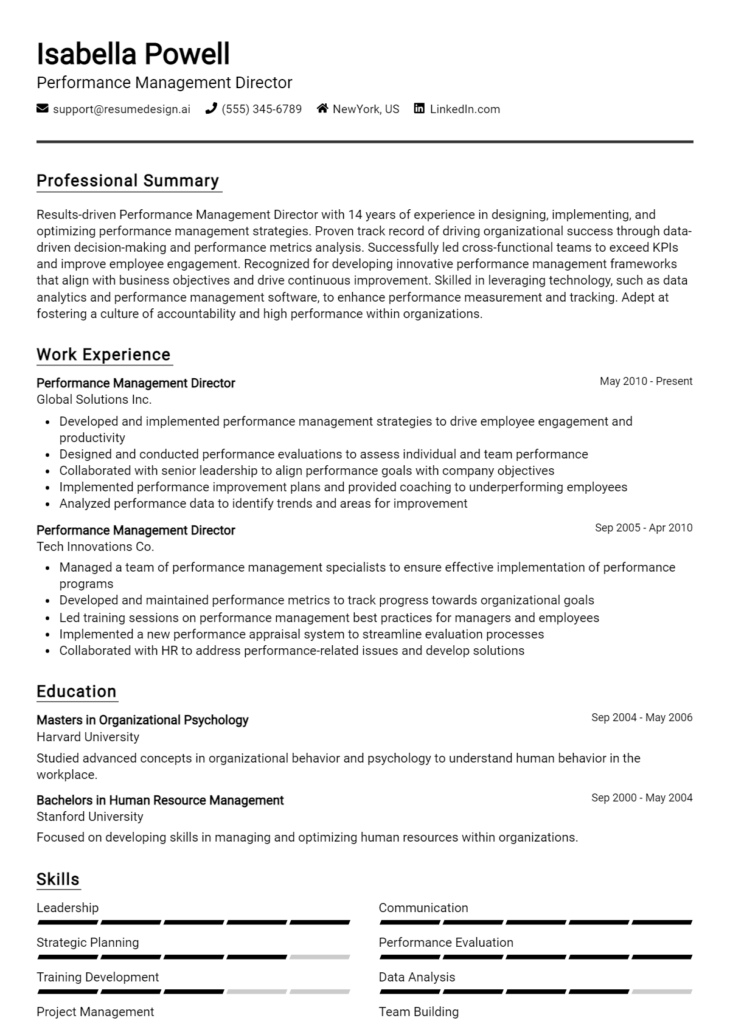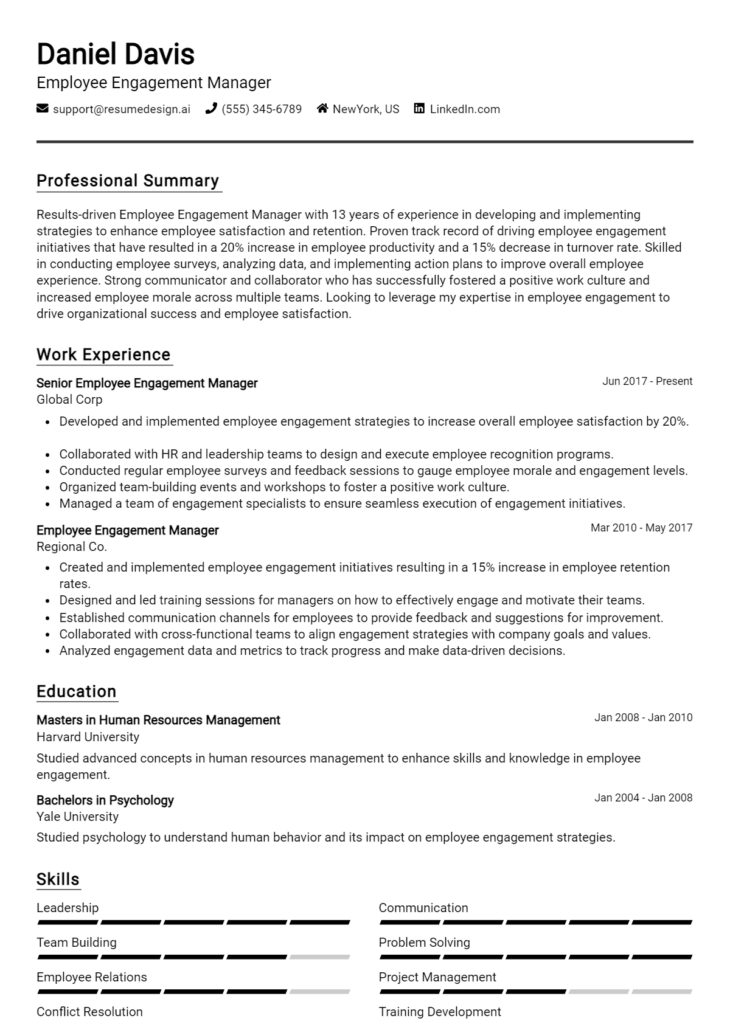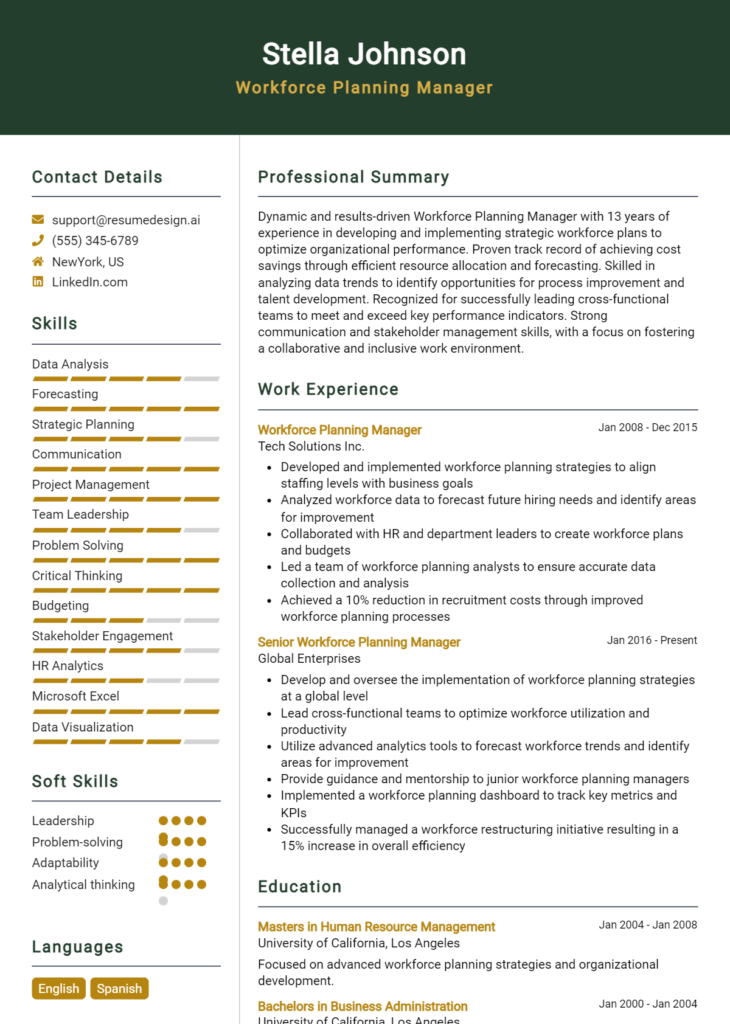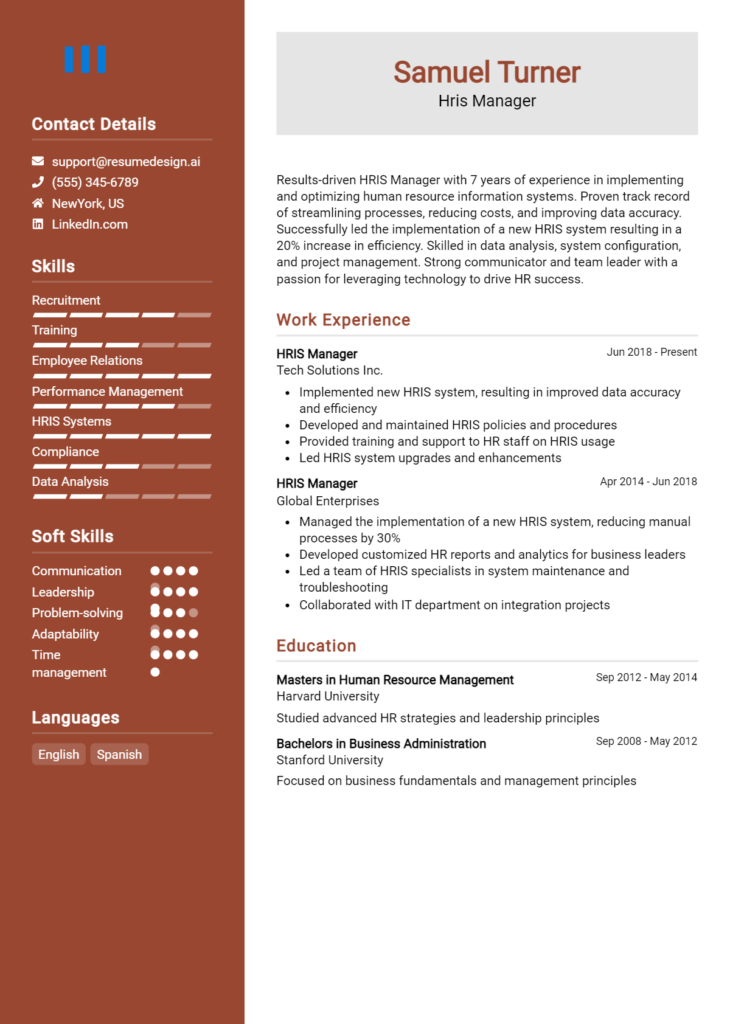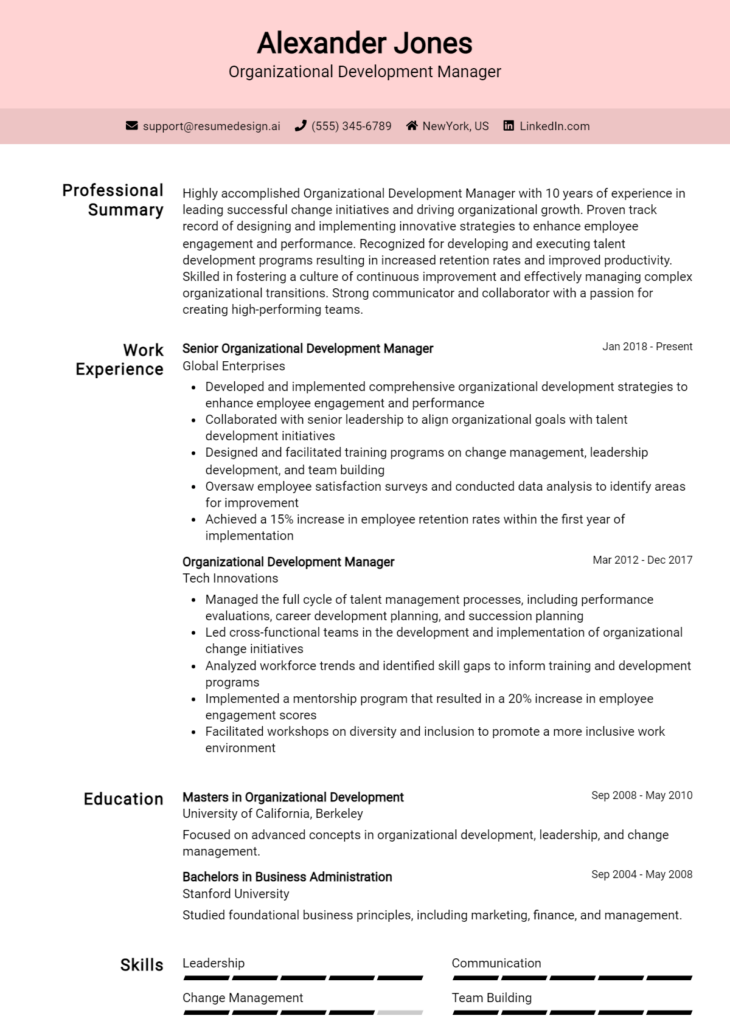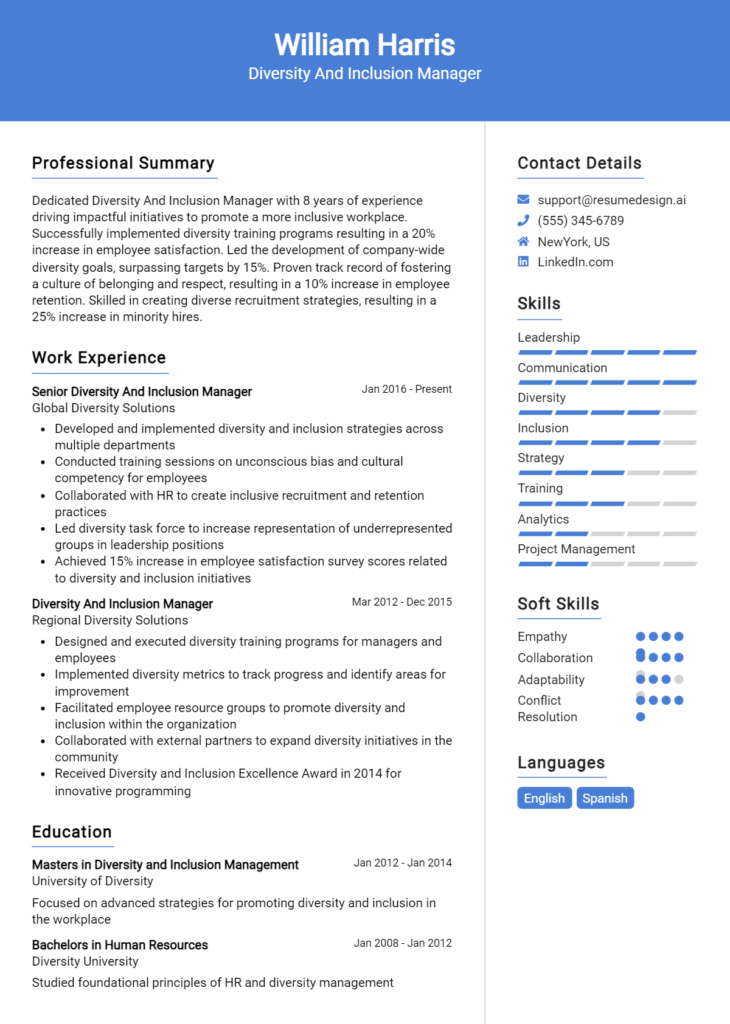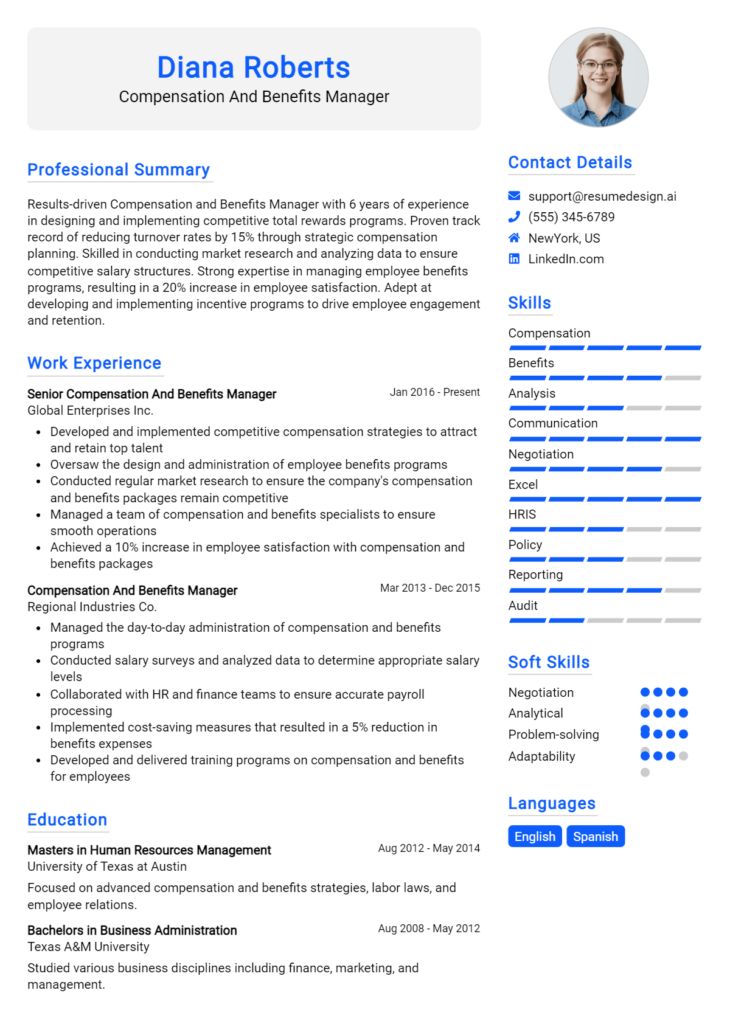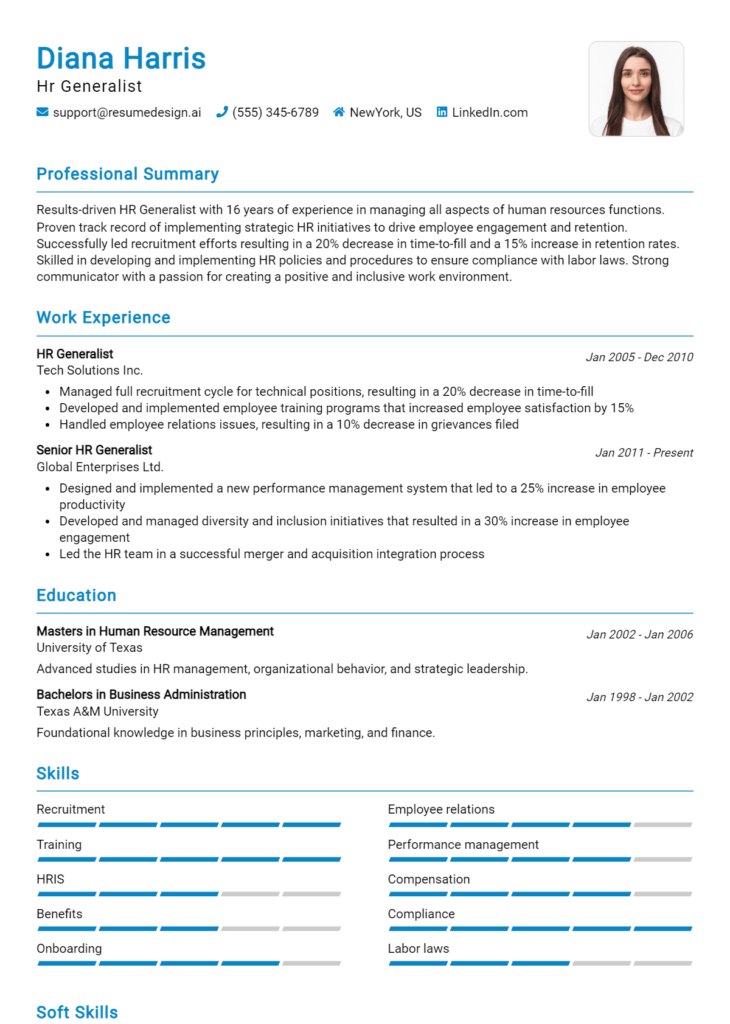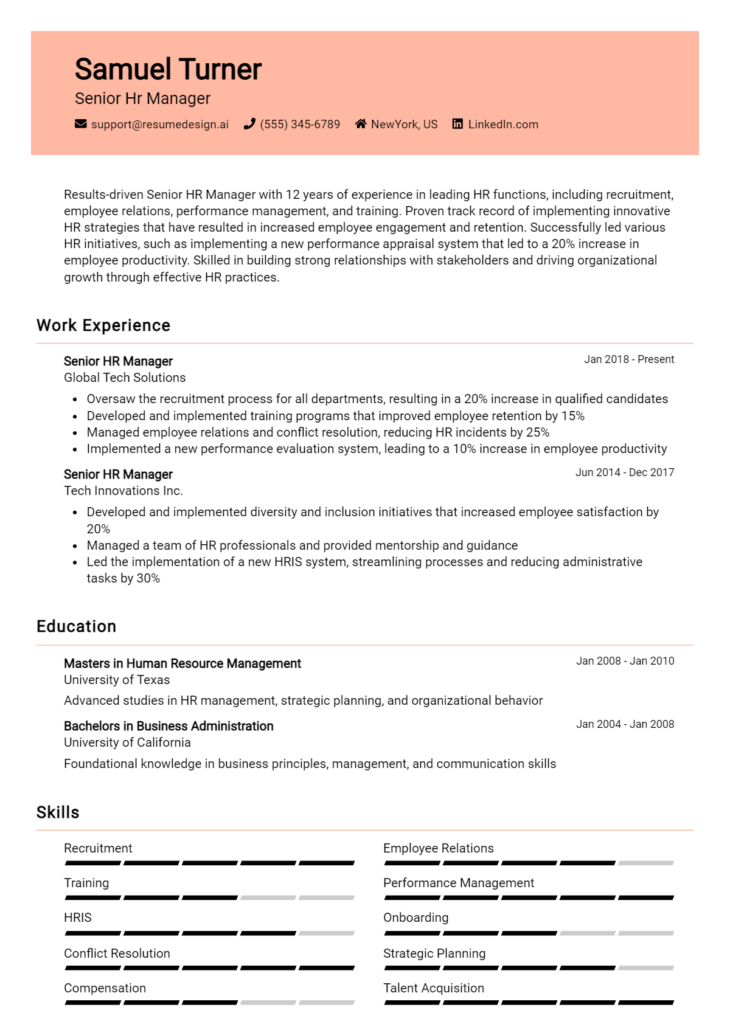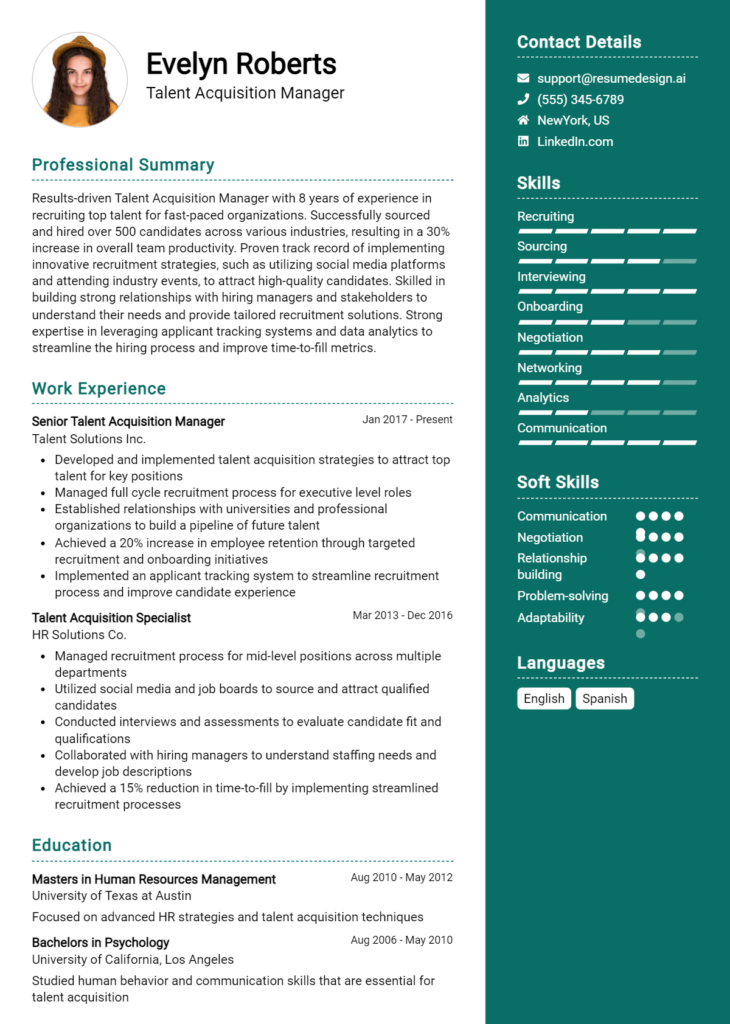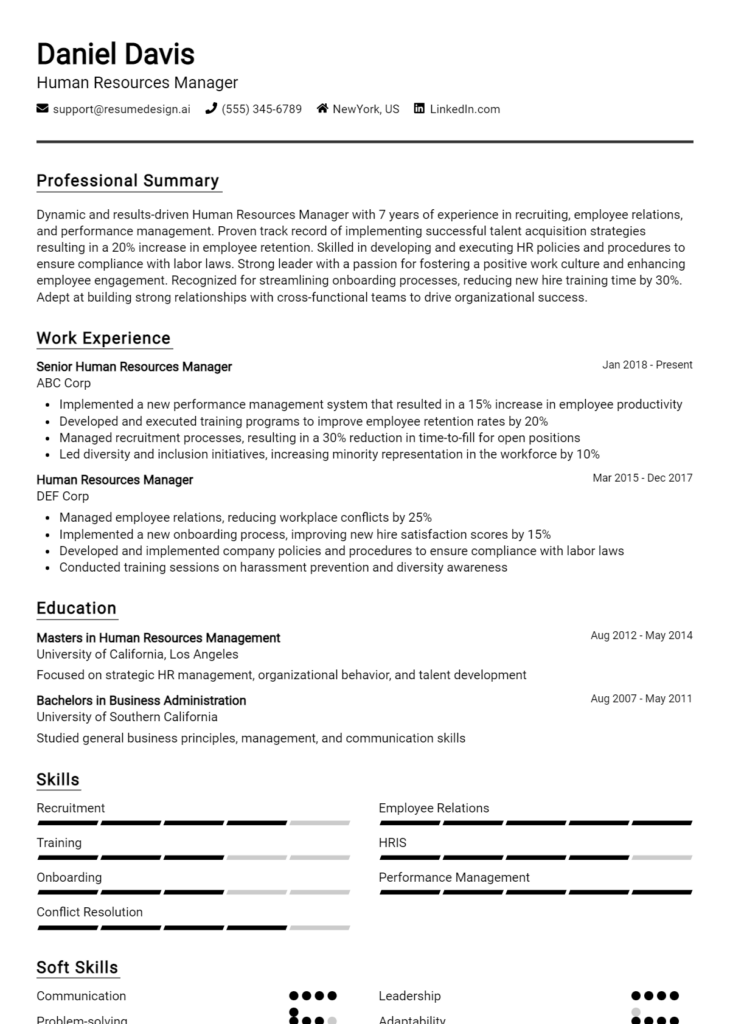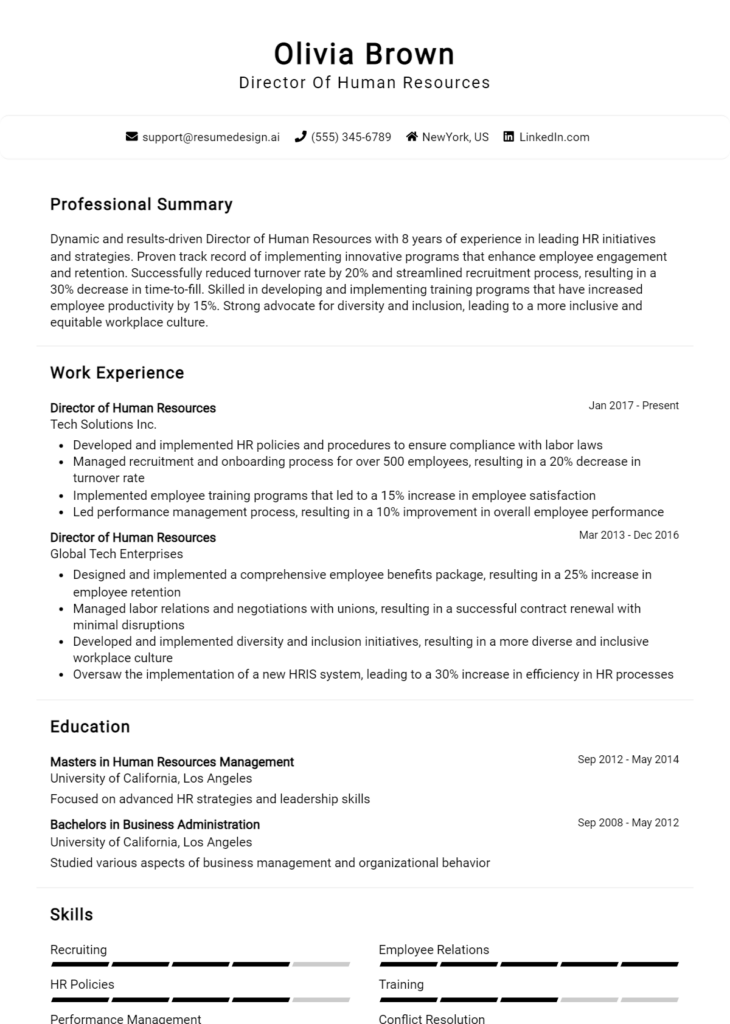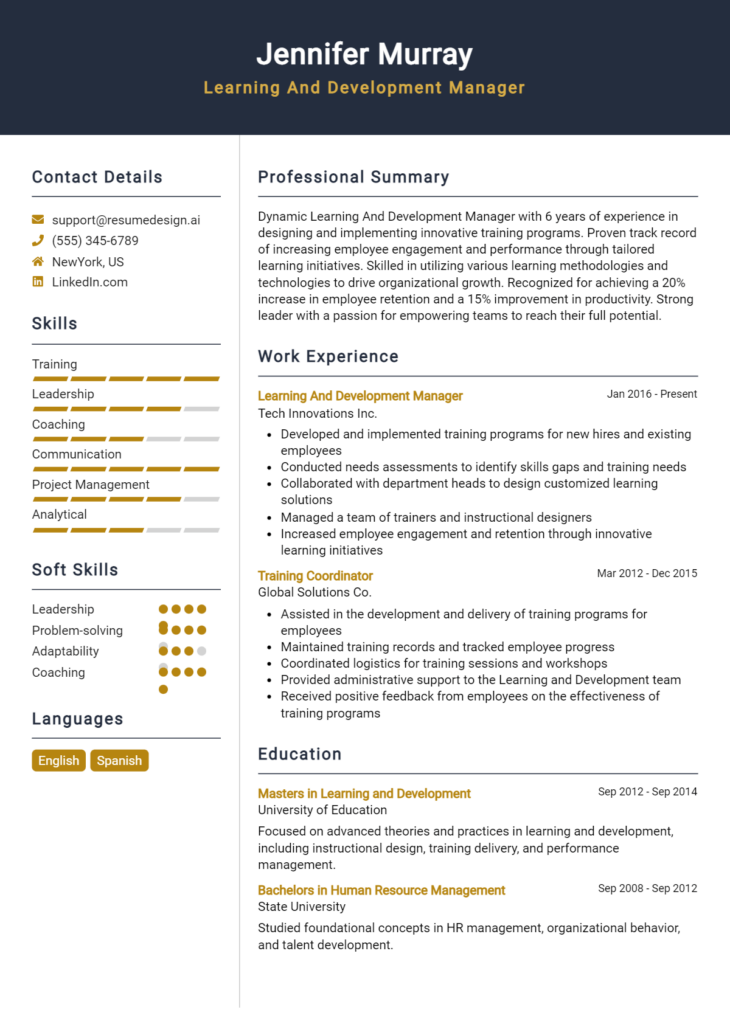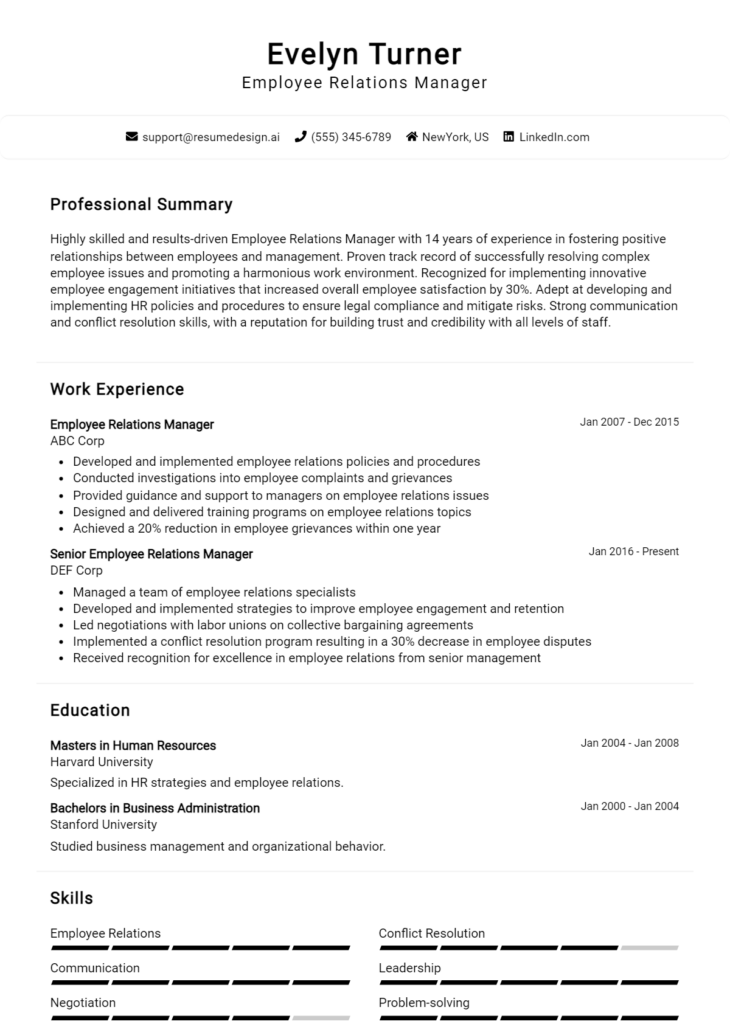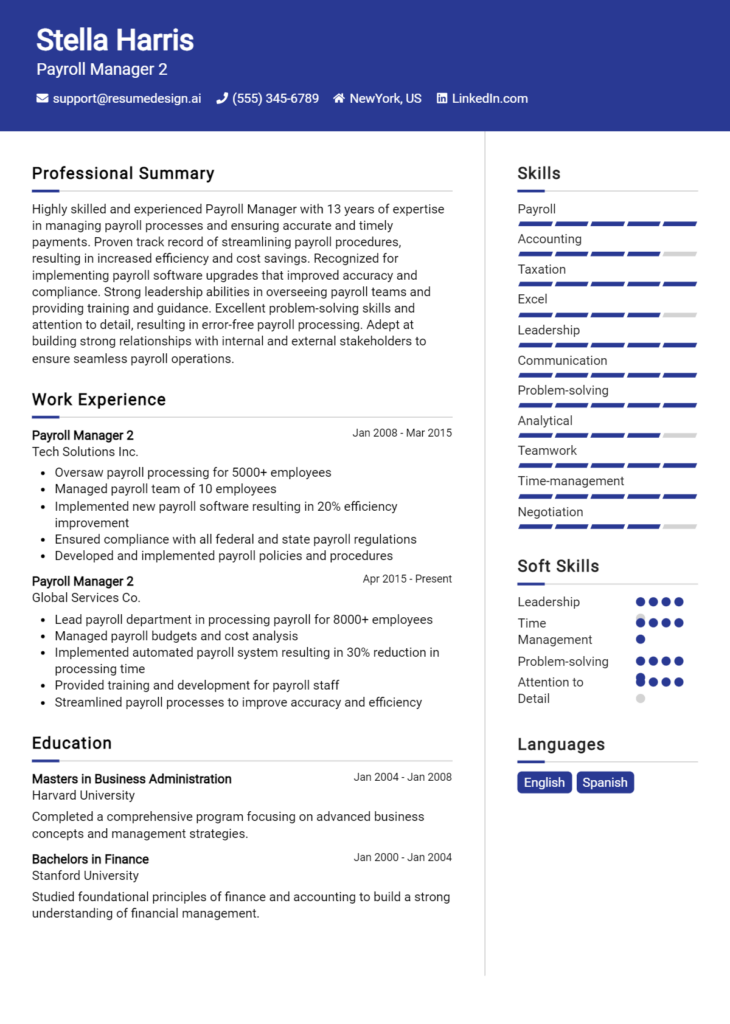Labor Relations Manager Core Responsibilities
A Labor Relations Manager plays a crucial role in fostering effective communication between management and employees, ensuring compliance with labor laws, and resolving workplace disputes. This position requires strong technical, operational, and problem-solving skills to navigate complex negotiations and implement strategic initiatives. By bridging different departments, the manager contributes to organizational goals and enhances workplace harmony. A well-structured resume that highlights these qualifications can significantly impact career advancement opportunities in this field.
Common Responsibilities Listed on Labor Relations Manager Resume
- Develop and implement labor relations strategies to promote positive workplace environments.
- Negotiate collective bargaining agreements with labor unions.
- Address and resolve employee grievances and disputes.
- Ensure compliance with labor laws and regulations.
- Conduct training sessions for management on labor relations practices.
- Analyze labor market trends and their impact on the organization.
- Collaborate with HR to develop policies that enhance employee relations.
- Monitor and report on labor relations metrics and trends.
- Advise management on labor relations issues and strategies.
- Facilitate communication between management and employees to foster trust.
- Participate in the development of workforce strategies to address labor shortages.
High-Level Resume Tips for Labor Relations Manager Professionals
In today’s competitive job market, a well-crafted resume is not just a document; it’s a powerful marketing tool that can open doors to new opportunities, especially for Labor Relations Manager professionals. Your resume serves as the first impression you make on potential employers, encapsulating your skills, experiences, and achievements in a concise format. It is essential that your resume reflects not only your qualifications but also your understanding of labor relations intricacies and your ability to foster positive employer-employee relationships. This guide will provide practical and actionable resume tips specifically tailored for Labor Relations Manager professionals, helping you stand out in a crowded field.
Top Resume Tips for Labor Relations Manager Professionals
- Tailor your resume to the job description by using relevant keywords and phrases that align with the specific role.
- Showcase relevant experience by prioritizing past roles that highlight your expertise in labor relations, negotiation, and conflict resolution.
- Quantify your achievements, such as successfully negotiating contracts or reducing employee grievances, to provide tangible proof of your impact.
- Highlight industry-specific skills, such as knowledge of labor laws, collective bargaining, and employee relations strategies, which are crucial for the role.
- Include a strong professional summary at the top of your resume that succinctly outlines your qualifications and career objectives.
- Utilize bullet points for clarity and to make your resume easy to read, ensuring that key accomplishments stand out.
- Incorporate relevant certifications, such as Certified Labor Relations Professional (CLRP), to enhance your credibility in the field.
- Maintain a clean and professional format, using consistent fonts and spacing to create an aesthetically pleasing document.
- Keep your resume concise, ideally one page, focusing on the most relevant information that demonstrates your suitability for the role.
By implementing these tips into your resume, you can significantly increase your chances of landing a job in the Labor Relations Manager field. A targeted and polished resume not only showcases your qualifications but also demonstrates your commitment to the profession, making you a standout candidate in the eyes of potential employers.
Why Resume Headlines & Titles are Important for Labor Relations Manager
In the competitive field of labor relations, a well-crafted resume headline or title plays a crucial role in capturing the attention of hiring managers. For a Labor Relations Manager, this brief yet impactful phrase can summarize key qualifications, skills, and experiences that align with the job requirements. A strong headline serves as a powerful first impression, offering a snapshot of a candidate's professional identity and value proposition. It should be concise, relevant, and directly related to the position being applied for, ensuring that it resonates with the employer’s needs and expectations.
Best Practices for Crafting Resume Headlines for Labor Relations Manager
- Keep it concise: Aim for a headline that is no more than 10-12 words.
- Be specific: Use industry-related terms that clearly convey your area of expertise.
- Highlight key skills: Incorporate essential skills that are relevant to the job.
- Showcase experience: Mention years of experience or specific accomplishments that set you apart.
- Use action-oriented language: Start with a strong verb to convey dynamism.
- Tailor to the job: Customize your headline for each application to match the job description.
- Avoid jargon: Make sure your headline is understandable to a broad audience, including HR professionals.
- Emphasize value: Focus on how your skills and experience can benefit the organization.
Example Resume Headlines for Labor Relations Manager
Strong Resume Headlines
Dynamic Labor Relations Manager with 10+ Years of Experience in Conflict Resolution
Strategic Labor Relations Specialist Skilled in Negotiation and Employee Advocacy
Proven Track Record in Managing Labor Relations and Fostering Positive Workplace Cultures
Weak Resume Headlines
Labor Relations Manager Looking for Job
Experienced Professional in Human Resources
The strong headlines are effective because they provide clear, specific information about the candidate's expertise and accomplishments, immediately signaling their suitability for the role. They are tailored to the position, showcasing relevant skills and experiences that resonate with hiring managers. In contrast, the weak headlines fail to impress due to their vagueness and lack of specificity; they do not convey any unique value or qualifications, making it difficult for employers to see what sets the candidate apart from others in the field.
Writing an Exceptional Labor Relations Manager Resume Summary
A well-crafted resume summary is essential for a Labor Relations Manager as it serves as the first impression for hiring managers. This brief yet powerful section quickly conveys the candidate's key skills, relevant experience, and notable accomplishments in the field of labor relations. A strong summary captures attention and establishes credibility, making it clear why the candidate is a perfect fit for the role. It should be concise, impactful, and specifically tailored to align with the job description, effectively setting the stage for the rest of the resume.
Best Practices for Writing a Labor Relations Manager Resume Summary
- Quantify Achievements: Use numbers and statistics to demonstrate your impact, such as successful negotiations or reductions in grievance rates.
- Focus on Relevant Skills: Highlight key skills that are crucial for the role, such as conflict resolution, negotiation, and communication.
- Tailor the Summary: Customize your summary for each job application, ensuring it aligns with the specific requirements and language of the job description.
- Keep it Concise: Aim for 2-4 sentences that succinctly convey your qualifications without overwhelming the reader.
- Use Action-Oriented Language: Start phrases with strong verbs to convey confidence and proactivity.
- Include Industry-Specific Terms: Demonstrating familiarity with labor relations terminology can enhance your credibility.
- Showcase Leadership Experience: If applicable, highlight any managerial roles or leadership responsibilities that demonstrate your ability to lead teams and manage conflicts.
- Emphasize Accomplishments: Focus on achievements that illustrate your effectiveness in improving labor relations and fostering positive workplace environments.
Example Labor Relations Manager Resume Summaries
Strong Resume Summaries
Results-driven Labor Relations Manager with over 10 years of experience negotiating collective bargaining agreements, achieving a 20% reduction in grievance filings within two years. Proven track record in implementing successful employee engagement programs that improved team morale by 35%.
Dynamic Labor Relations professional adept at resolving complex labor disputes and fostering collaborative workplace environments. Successfully led a cross-functional team to negotiate a new labor contract, resulting in a 15% wage increase while maintaining organizational profitability.
Strategic Labor Relations Manager with expertise in building strong labor-management partnerships. Spearheaded initiatives that decreased turnover rates by 30% and enhanced employee satisfaction scores by 25% through targeted conflict resolution strategies.
Weak Resume Summaries
Labor Relations Manager with experience in the field. Good at handling employee issues and negotiations.
Experienced professional looking for a Labor Relations position. Knowledgeable about labor laws and regulations.
The strong resume summaries are considered effective because they are specific, quantifiable, and directly relevant to the role of a Labor Relations Manager. They provide clear evidence of the candidate's impact and expertise within the industry. In contrast, the weak summaries are vague and lack measurable outcomes, making it difficult for hiring managers to gauge the candidate's qualifications or unique contributions. They do not effectively convey the candidate's suitability for the position, reducing their chances of standing out in a competitive job market.
Work Experience Section for Labor Relations Manager Resume
The work experience section is a critical component of a Labor Relations Manager's resume, serving as a platform to demonstrate the candidate's technical skills, leadership capabilities, and proficiency in delivering high-quality outcomes. This section not only outlines past roles and responsibilities but also emphasizes the ability to navigate complex labor relations issues, manage teams effectively, and implement strategies that align with industry standards. Quantifying achievements, such as improvements in negotiation outcomes or reductions in grievances, is essential to convey the impact of the candidate's work, making it vital to align experiences with the expectations of the labor relations field.
Best Practices for Labor Relations Manager Work Experience
- Highlight specific technical skills relevant to labor relations, such as negotiation, conflict resolution, and compliance.
- Include quantifiable results to showcase the effectiveness of initiatives, such as percentage reductions in grievances or successful contract negotiations.
- Demonstrate leadership by describing experiences in managing teams or projects and fostering collaboration among diverse stakeholders.
- Tailor the descriptions of past roles to reflect responsibilities and achievements that align with the requirements of the labor relations industry.
- Use action verbs to convey a proactive approach, illustrating a strong sense of responsibility and initiative.
- Incorporate industry-specific terminology to showcase familiarity with labor laws, policies, and best practices.
- Provide context for achievements by explaining challenges faced and strategies employed to overcome them.
- Maintain a clear, concise format that allows hiring managers to quickly assess qualifications and relevant experience.
Example Work Experiences for Labor Relations Manager
Strong Experiences
- Successfully negotiated a five-year labor contract that resulted in a 15% increase in employee satisfaction and a 25% reduction in grievances filed.
- Led a team of 10 HR professionals in implementing a new conflict resolution training program, reducing workplace disputes by 30% within the first year.
- Developed and executed a compliance strategy that ensured 100% adherence to federal labor laws, resulting in zero penalties for the organization over three years.
- Facilitated cross-functional collaboration between management and union representatives, which improved communication and led to a 40% increase in joint decision-making initiatives.
Weak Experiences
- Was involved in labor relations initiatives without specifying outcomes or contributions.
- Assisted in negotiations with no mention of the impact or success of these efforts.
- Managed a team but did not provide details on the size of the team or specific accomplishments.
- Participated in compliance activities but failed to mention any measurable results or improvements.
The strong experiences listed above are considered impactful because they provide specific, quantifiable outcomes that demonstrate effectiveness in labor relations roles. They highlight the candidate's technical expertise, leadership abilities, and collaborative efforts, showcasing a direct connection between actions taken and positive results. In contrast, the weak experiences lack detail and measurable achievements, making them less compelling and failing to convey the candidate's value in the labor relations field.
Education and Certifications Section for Labor Relations Manager Resume
The education and certifications section of a Labor Relations Manager resume is crucial as it provides insight into the candidate's academic background and professional qualifications. This section not only showcases relevant degrees but also highlights industry-recognized certifications and ongoing education efforts that demonstrate a commitment to continuous learning. By including pertinent coursework and specialized training, candidates can significantly enhance their credibility, showcasing their alignment with the demands of the role and their preparedness to handle complex labor relations issues effectively.
Best Practices for Labor Relations Manager Education and Certifications
- Prioritize relevant degrees such as Human Resources Management, Labor Relations, or Business Administration.
- Include industry-recognized certifications like SHRM-CP, SHRM-SCP, or PHR to demonstrate expertise.
- List specialized training programs focused on negotiation, conflict resolution, or labor law.
- Provide specific coursework that pertains to labor relations, employment law, or organizational behavior.
- Highlight advanced degrees (e.g., Master's) or specialized certifications that set you apart from other candidates.
- Ensure clarity and consistency in formatting to enhance readability and professionalism.
- Update this section regularly to reflect new qualifications and ongoing professional development.
- Tailor the education and certifications to match the job description, emphasizing the most relevant qualifications.
Example Education and Certifications for Labor Relations Manager
Strong Examples
- M.A. in Labor Relations and Human Resources, XYZ University, 2021
- SHRM-SCP Certification, Society for Human Resource Management, 2022
- Certificate in Negotiation and Conflict Resolution, ABC Institute, 2020
- Relevant Coursework: Employment Law, Organizational Behavior, Collective Bargaining Strategies
Weak Examples
- Bachelor's Degree in History, DEF University, 2010
- Certification in Project Management, GHI Association, 2015
- Basic Computer Skills Course, Online Learning Platform, 2018
- High School Diploma, JKL High School, 2005
The examples listed as strong are considered effective because they directly relate to the competencies and knowledge necessary for a Labor Relations Manager. They reflect advanced education and relevant certifications that enhance the candidate's qualifications for the role. In contrast, the weak examples illustrate degrees and certifications that do not align with labor relations or human resources, demonstrating a lack of focus or relevance to the position, which could undermine the candidate's credibility in a competitive job market.
Top Skills & Keywords for Labor Relations Manager Resume
A well-crafted resume for a Labor Relations Manager is essential for standing out in a competitive job market. The right combination of skills not only highlights your qualifications but also demonstrates your ability to navigate the complexities of labor relations effectively. Employers seek candidates who possess both hard and soft skills, as these competencies are vital for fostering positive relationships between management and employees, negotiating contracts, and resolving disputes. By showcasing these skills, you can illustrate your capability to contribute to a harmonious workplace and ensure compliance with labor laws.
Top Hard & Soft Skills for Labor Relations Manager
Soft Skills
- Excellent communication skills
- Strong negotiation abilities
- Conflict resolution expertise
- Empathy and emotional intelligence
- Critical thinking and problem-solving
- Leadership and team management
- Adaptability and flexibility
- Active listening
- Relationship-building skills
- Cultural awareness and sensitivity
Hard Skills
- Knowledge of labor laws and regulations
- Contract negotiation skills
- Understanding of collective bargaining processes
- Proficiency in HR software and systems
- Data analysis and reporting
- Mediation and arbitration techniques
- Familiarity with grievance procedures
- Policy development and implementation
- Compliance auditing
- Training and development facilitation
For a deeper look into how to effectively present your skills, check out our comprehensive guide on skills and understand the significance of highlighting relevant work experience in your resume.
Stand Out with a Winning Labor Relations Manager Cover Letter
I am writing to express my interest in the Labor Relations Manager position at [Company Name] as advertised on [where you found the job listing]. With over [X years] of experience in labor relations and a proven track record of successfully negotiating contracts and resolving disputes, I am confident in my ability to contribute positively to your team. My background in human resources, combined with my strong communication skills and strategic mindset, positions me well to effectively manage the complexities of labor relations within your organization.
In my previous role at [Previous Company Name], I successfully led negotiations that resulted in a [specific achievement, e.g., a 10% reduction in labor costs or an agreement that improved employee satisfaction by X%]. My approach focuses on fostering a collaborative environment between management and union representatives. I believe that open dialogue and mutual respect are crucial for maintaining a positive workplace culture. By building relationships based on trust and transparency, I have been able to resolve conflicts before they escalate, which has not only saved time and resources but also contributed to a more harmonious workplace.
I am particularly drawn to [Company Name] because of its commitment to [specific values or initiatives related to labor relations]. I admire how your organization prioritizes employee welfare while maintaining a focus on operational efficiency. I am eager to bring my expertise in labor law, conflict resolution, and employee engagement strategies to help further your goals and ensure compliance with all relevant regulations. I am excited about the opportunity to collaborate with your team and implement innovative approaches to labor relations that foster a productive and engaging work environment.
Thank you for considering my application. I look forward to the possibility of discussing how my experience and vision align with the goals of [Company Name]. I am enthusiastic about the chance to contribute to your organization and am eager to bring my skills in labor relations management to your esteemed company. Please feel free to contact me at [your phone number] or [your email address] to arrange a conversation.
Common Mistakes to Avoid in a Labor Relations Manager Resume
When crafting a resume for a Labor Relations Manager position, it's crucial to present a clear and compelling narrative of your professional journey. Many candidates make common missteps that can undermine their qualifications. Avoiding these pitfalls can significantly enhance your chances of landing an interview. Here are some frequent mistakes to watch out for:
Generic Objective Statements: Using a one-size-fits-all objective can make your resume feel impersonal. Tailor your objective to reflect your specific interest in labor relations and how your skills align with the employer’s needs.
Lack of Quantifiable Achievements: Failing to provide measurable outcomes from your previous roles can weaken your resume. Use statistics and specific examples to showcase how you improved labor relations, resolved conflicts, or enhanced employee satisfaction.
Ignoring Relevant Skills: Not highlighting key skills relevant to labor relations, such as negotiation, conflict resolution, and communication, can make your resume less effective. Ensure these competencies are prominently featured and supported by examples.
Inconsistent Formatting: A resume with inconsistent fonts, sizes, and styles can appear unprofessional. Maintain a uniform format throughout to enhance readability and create a consistent professional image.
Overly Lengthy Descriptions: Providing excessive detail in job descriptions can dilute your main points. Keep descriptions concise and focused on the most relevant responsibilities and accomplishments.
Neglecting Soft Skills: Labor relations require strong interpersonal skills. Omitting soft skills like empathy, active listening, and collaboration can leave out important qualities that employers are seeking.
Not Tailoring the Resume for Each Application: Submitting the same resume for every job application can hinder your chances. Customize your resume to reflect the specific requirements and culture of each organization you apply to.
Failure to Proofread: Typos and grammatical errors can create a negative impression. Always proofread your resume to ensure it is polished and professional, as mistakes can imply a lack of attention to detail.
Conclusion
In summary, the role of a Labor Relations Manager is critical in fostering effective communication between management and employees, ensuring compliance with labor laws, and negotiating collective bargaining agreements. A successful Labor Relations Manager must possess strong interpersonal skills, a deep understanding of labor legislation, and the ability to mediate disputes effectively. Moreover, the position requires strategic thinking to align labor relations strategies with organizational goals.
As you reflect on your qualifications for this vital role, it’s essential to present your experience and skills in the best possible light. An updated and polished resume can make all the difference in showcasing your expertise. We encourage you to take the next step in your career journey by reviewing your Labor Relations Manager resume.
To assist you in this process, consider utilizing the following resources:
- Resume Templates to find a format that fits your style.
- Resume Builder for a user-friendly way to craft your resume.
- Resume Examples to gain inspiration from successful Labor Relations Managers.
- Cover Letter Templates to complement your resume and make a strong impression.
Take action today and enhance your resume to stand out in the job market!

